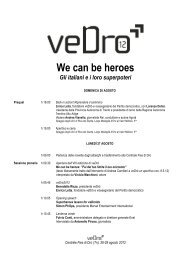democracy - Vision the Italian Think Tank
democracy - Vision the Italian Think Tank
democracy - Vision the Italian Think Tank
You also want an ePaper? Increase the reach of your titles
YUMPU automatically turns print PDFs into web optimized ePapers that Google loves.
2. <strong>the</strong> inequalities; if we try, moreover, to observe ano<strong>the</strong>r chart, that of <strong>the</strong> mostunequal nations, measured from <strong>the</strong> wealth percentage that is <strong>the</strong> prerogative of<strong>the</strong> first decile (<strong>the</strong> 10% most rich) of <strong>the</strong> population, only three 6 – on <strong>the</strong>contrary – of <strong>the</strong> Nations on <strong>the</strong> list are democratic Nations;3. <strong>the</strong> variation in time of <strong>the</strong> number of democracies in respect to <strong>the</strong> totalamount 7 ; if in 1975 “democracies” 8 were 35 and <strong>the</strong>refore less than a quarter of<strong>the</strong> total (23,8%), in 1995 <strong>the</strong>y doubled (78) representing half (47,6%) of <strong>the</strong>total amount.Democracy seems to produce more wealth, to distribute it better and, consequently, itseems to obtain an ever growing consensus.The classics of economic <strong>the</strong>ory explain to us <strong>the</strong> reasons for <strong>democracy</strong>’s superiorityin terms of capacity to produce wellbeing. A democratic Country, like Adam Smith 9seemed to remember when he thought of American colonies, naturally has moreresistant antibodies in respect to <strong>the</strong> danger of consolidating monopolies and unfairadvantage positions and it favours mostly <strong>the</strong> development of competitive conditionsthat are essential in allocating scarce resources to <strong>the</strong> most effective enterprise. Witha more elegant argument Amartya Sen reminds us that greater <strong>democracy</strong> meansincorporating more “information” in <strong>the</strong> collective decision making process and<strong>the</strong>refore greater chances that those choices produce greater wellbeing for a greaternumber of people.But it is still Amartya Sen that yet says something more: <strong>democracy</strong>, or ra<strong>the</strong>rfreedom, is not <strong>the</strong> best guarantee of development (that it is not just economicdevelopment as some Indian states demonstrate). It is also a worthy objective initself, apart from <strong>the</strong> reflection in terms of wellbeing, to be pursued and defended.Is all well <strong>the</strong>n? Is <strong>the</strong> magnificent fate of <strong>democracy</strong> really unstoppable?Not really. In reality, if we go back to <strong>the</strong> numbers that we just saw, and if we changea little <strong>the</strong> perspective, <strong>the</strong>y tell a different story:1. If instead of <strong>the</strong> absolute values of gross domestic product per inhabitant, weshift to growth rates 10 <strong>the</strong> list of <strong>the</strong> fastest growing twenty nations 11 presents5 Different would be <strong>the</strong> risult if one conciders <strong>the</strong> growth rates of which <strong>the</strong> special chart today shows, obviously,planet Cina in <strong>the</strong> first places6 All three have become democratic recently: Brazil, Messico and Souht Africa7 Potter et al., 1997 Democratization, Policy Press: Cambridge8 Intended like Nations that have free elections and of some o<strong>the</strong>r fundamental rights coded by researches like that ofDahl, Democracy and its cities, New Haven: Yale University Press.9 The Wealth of Nations, 1776, Cambridge, Penguin Books10 Source The World FactBook, Washington, D.C. – CIA, 2001 and US Department of State11 Last years leader was Turkmeinstan5





